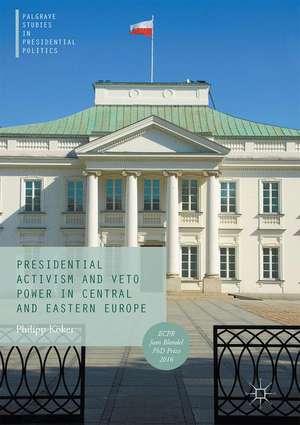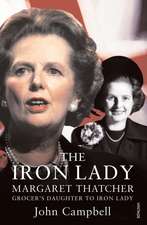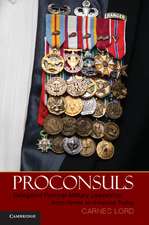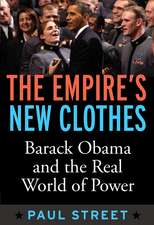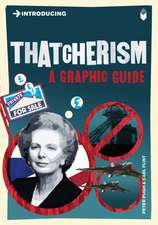Presidential Activism and Veto Power in Central and Eastern Europe: Palgrave Studies in Presidential Politics
Autor Philipp Kökeren Limba Engleză Hardback – 5 iul 2017
| Toate formatele și edițiile | Preț | Express |
|---|---|---|
| Paperback (1) | 582.02 lei 39-44 zile | |
| Springer International Publishing – aug 2018 | 582.02 lei 39-44 zile | |
| Hardback (1) | 643.48 lei 6-8 săpt. | |
| Springer International Publishing – 5 iul 2017 | 643.48 lei 6-8 săpt. |
Preț: 643.48 lei
Preț vechi: 757.04 lei
-15% Nou
Puncte Express: 965
Preț estimativ în valută:
123.13€ • 127.03$ • 102.75£
123.13€ • 127.03$ • 102.75£
Carte tipărită la comandă
Livrare economică 27 martie-10 aprilie
Preluare comenzi: 021 569.72.76
Specificații
ISBN-13: 9783319519135
ISBN-10: 3319519131
Pagini: 295
Ilustrații: XVIII, 297 p. 1 illus.
Dimensiuni: 148 x 210 x 25 mm
Greutate: 0.5 kg
Ediția:1st ed. 2017
Editura: Springer International Publishing
Colecția Palgrave Macmillan
Seria Palgrave Studies in Presidential Politics
Locul publicării:Cham, Switzerland
ISBN-10: 3319519131
Pagini: 295
Ilustrații: XVIII, 297 p. 1 illus.
Dimensiuni: 148 x 210 x 25 mm
Greutate: 0.5 kg
Ediția:1st ed. 2017
Editura: Springer International Publishing
Colecția Palgrave Macmillan
Seria Palgrave Studies in Presidential Politics
Locul publicării:Cham, Switzerland
Cuprins
1. Introduction.- Part I: Patterns of Presidential Activism.- 2. Determinants of Presidential Activism.- 3. The Use of Presidential Vetoes in Central and Eastern Europe- Part II: Presidential Activism in Practice.- 4. Understanding presidential activism: Veto Use in Estonia and Poland.- 5. Understanding Presidential Activism: Veto Use in Hungary and Slovakia.- 6. Presidents in government formation and censure- Part III: Understanding Presidential Activism.- 7. Integrating Quantitative and Qualitative Findings on Presidential Activism.- 8. Conclusion: Studying Presidential Activism in Central and Eastern Europe and Beyond.
Notă biografică
Philipp Köker is Senior Research Fellow in Politics and IR at Canterbury Christ Church University, UK. He specialises in the comparative study of presidents and political parties in modern democracies. He won the ECPR Jean Blondel PhD Prize 2016 for the best thesis in politics.
Textul de pe ultima copertă
This book examines the use of presidential powers in Central and East Europe between 1990 and 2010. Focussing on presidential vetoes and the formation of governments, it maps patterns of presidential activism and its determinants across nine democracies. Thereby, it combines the analysis of original quantitative data on the use of presidential powers with in-depth case studies in an innovative mixed-methods framework. Based on regression analyses and unique insights from numerous elite interviews, the study shows strong support for the hitherto insufficiently tested assumption that popularly elected presidents are more active than their indirectly elected counterparts. As one of the first comprehensive comparative studies of presidential activism and veto power in Europe, this book will be a key resource not only for area specialists but also for scholars of presidential studies, comparative government, and executives.
Caracteristici
Based on the winner of ECPR's 2016 Jean Blondel Prize for Best PhD Provides one of the first comprehensive comparative studies of presidential veto power in Europe Selects innovative case studies from nine democracies across Central and Eastern Europe Includes unique insights into presidential politics gathered through a large number of interviews
